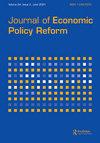从收费公路到收费公路:澳大利亚私人融资公共基础设施的政府政策简史
IF 3.2
3区 经济学
Q1 DEVELOPMENT STUDIES
引用次数: 4
摘要
摘要:自1980年私人融资公共基础设施项目(PFPI)在现代PFPI时代首次使用以来,澳大利亚在使用私人融资公共设施项目(也称为公私伙伴关系)方面一直处于世界领先地位。本文认为,澳大利亚PFPI经历了四个关键阶段,并追踪了辩论中的关键转折点。这些阶段的关键层面包括扶持政策机构、税收状况、竞争紧张、风险转移、会计处理、物有所值、政府担保和混合金融。它表明,PFPI政策的演变可以归因于政治趋势、对公众监督的反应以及技术方法的进步。本文章由计算机程序翻译,如有差异,请以英文原文为准。
From turnpikes to toll-roads: a short history of government policy for privately financed public infrastructure in Australia
ABSTRACT Australia has been a world leader in the use of privately financed public infrastructure projects (PFPI), otherwise known as public private partnerships (PPPs), since their first use in the modern-PFPI-era commencing in 1980. This article argues that Australian PFPI has evolved through four key phases and tracks the key inflection points in debate. Critical dimensions in these phases include the enabling policy apparatus, tax status, competitive tension, risk transfer, accounting treatment, value-for-money, government guarantees and hybrid finance. It suggests that the evolution of PFPI policy can be attributed to political tendencies, responses to public scrutiny and advances in technical approaches.
求助全文
通过发布文献求助,成功后即可免费获取论文全文。
去求助
来源期刊

Journal of Economic Policy Reform
Multiple-
CiteScore
6.60
自引率
0.00%
发文量
14
期刊介绍:
The Journal of Economic Policy Reform focuses on the analysis of economic policy reform. The journal draws upon what lessons can be learned from the successes and failures of countries undertaking reforms and how existing theories can be developed to shed light on positive as well as normative aspects of the reform process. The Journal of Economic Policy Reform encourages work from economists and political economy analysts on policies to promote growth and reduce poverty, intellectual property rights, aid versus trade, debt and debt relief, taxation and social security systems, surveys of key reform issues, as well as on corruption, democracy, emerging markets and the role of multilateral institutions.
 求助内容:
求助内容: 应助结果提醒方式:
应助结果提醒方式:


